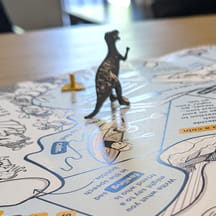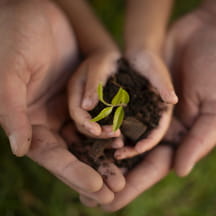In a sense, Mollie Grow was born to address the effects of climate change.
“I was actually born on April 22 — Earth Day,” said Grow, MD, MPH, pediatrician at and associate program director at the University of Washington (UW) pediatrics residency program. “I’ve had a lifelong interest in caring for the planet since I first became aware that I shared my birthday with Earth Day.”
So, it was a perfect fit when a group of pediatric residents asked Grow and her colleagues to launch an effort focusing on climate change’s effects on children’s health. That effort culminated in the Climate Change CARE (Clinical, Advocacy, Research, and Education) Committee, which began with a handful of residents and faculty advisers and has grown to about 50 members representing a cross section of staff from Seattle Children's and UW Pediatrics.
The committee has become the de facto adviser for hospital leadership’s climate considerations, and it accelerates and augments the university’s and hospital’s sustainability work.
One focus area is reducing the impact of fossil fuels. The committee not only works to encourage less reliance on fossil fuels and other greenhouse gases (such as those in anesthetic gases) at Seattle Children’s, but also advocates for divestments in the fossil fuel industries more broadly.
Meetings that matter
The residents who pitched the concept of a distinct climate change group wanted to represent the concerns of pediatricians to organization leadership. “As the residents were graduating, we recognized the need to keep the initiative going and expand engagement,” Grow said. Now open to all team members, the group is a formalized department-wide committee comprising several subcommittees aligned with its clinical, advocacy, research, and educational goals.
The committee’s monthly meetings include guest speakers who share ideas about effective programs elsewhere and include two key components:
Action items. Each meeting begins with an actionable step committee members can take right then, such as signing on to an advocacy letter, registering for a listserv to learn about additional opportunities to make a difference in the community, or enrolling in legislative advocacy efforts.
Wins. The committee shares updates of progress made on its initiatives, no matter how large or small. A recent example includes the publication of research around the role of climate change on children’s mental health, pushed forward thanks to the work of the Climate Change CARE Committee.
These agenda items are essential, according to Grow, because they help members feel a much-needed sense of accomplishment.
“A lot of people have eco-anxiety or climate grief,” Grow said. “Coming together and taking action collectively is a way to combat those feelings of hopelessness.”
Making it work
Leadership buy-in is crucial to the growth and impact of the Climate Change CARE Committee. The director of sustainability at Seattle Children’s is directly involved, and the committee meets regularly with the UW pediatrics department chair to recommend policy changes.
Grow carves time out of her schedule dedicated solely to committee work — she said that kind of support is crucial in moving their agenda forward. They’re currently working on a proposal to add a medical director of sustainability with additional protected time for the climate change efforts.
But that level of resource allocation didn’t come automatically; Grow said you may need to start small and produce results to justify leadership support.
“The fact that we did a lot of things on our own initially helped us build the case for having something that was more formal,” Grow said. “We could then leverage the fact that we've been successful and could negotiate for some protected time and funding.”
Connecting to the purpose
The Climate Change CARE Committee participates in community events to restore parks and other green spaces in the area. Planting trees and digging gardens builds camaraderie and provides team members with a visible example of the change their efforts can bring to the world.
“Bringing residents, faculty, and staff together to dig in the dirt is very meaningful,” Grow said. “It’s concrete and hands-on, and something people can do collectively — it’s empowering.” Grow hopes sharing her team’s experience will inspire others working in children’s health. “This is a team effort to protect our children’s health for the future; we hope everyone around the country will join us.”



